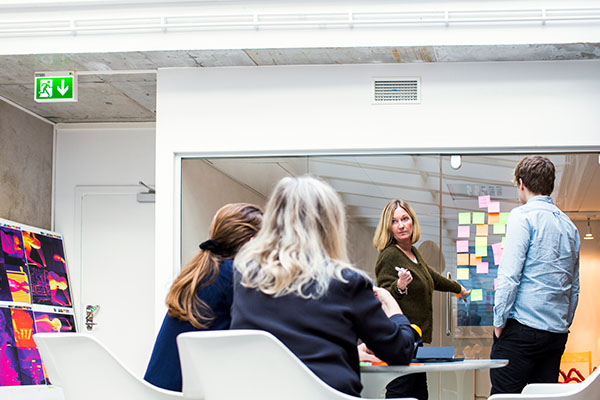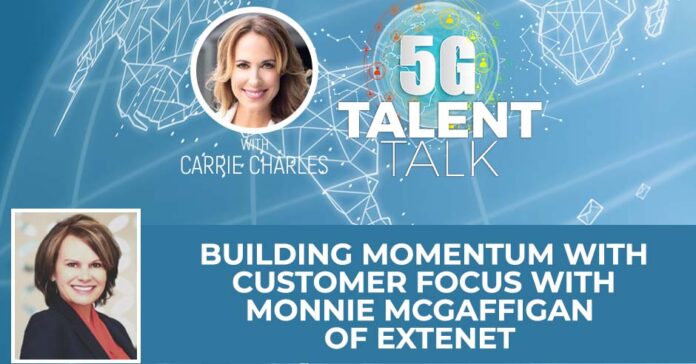Putting your customer first requires adding value to your customers and relationships every step of the way. Particularly in communications infrastructure, developing a customer-first culture is done through taking the complexity out of what is a very complex business. Joining Carrie Charles today is Monnie McGaffigan, the Chief Revenue Officer of ExteNet Systems, a leading national provider of converged communications infrastructure and services addressing outdoor, real estate, communities and enterprise advanced connectivity needs. For Monnie, removing the complexity means managing budgets, accelerating building plans and generally taking problems off of customers’ hands. Listen along as Monnie shares her experience of getting started in telecom, where she is now and her vision for the future at ExteNet.
—
Watch the episode here
Listen to the podcast here
Building Momentum with Customer Focus with Monnie McGaffigan of ExteNet
I have a phenomenal episode for you. I’m happy to have as my guest, one of my friends and also a woman that I have enormous respect for, Monnie McGaffigan. She is the Chief Revenue Officer of ExteNet Systems. Monnie, thank you so much. I’ve been wanting to get you on the show forever. Thanks for coming on.
Carrie, thank you for having me. I’m thrilled to be here.
We’re going to have a blast. I cannot wait to get into everything with you. We’re going to have fun. First, let’s start with, how did you get to the seat that you are in?
It was a long journey. My story is that I got into the telecom world and it was my second job out of college. I was a little Cal state girl out of California and didn’t know what I wanted to be when I grew up. I had a friend that found their way into a telecom that said, “There are some good job opportunities over here. Take a look.”
I started as a field door-knocking salesperson back in the day with Sprint. It was wonderful. There were fabulous people and great training. I got the telecom bug. I worked my way up the ladder at Sprint. I did sales training, took on a management role, moved a couple of times, took a director role primarily in B2B sales, enterprise sales, strategic sales and those kinds of things and had a great time. I did a little data center stuff there and dipped my toe into all parts of the business.
My last assignment was I was responsible for the wireline business unit, which was about a $4 billion business unit. I had strategic alliances which were Microsoft, IBM and Cisco, those kinds of relationships or partnerships and go-to-market strategies. I did a lot of interesting things. I had a great time and then the company and I were going through some transitions. Years later, I raised my hand and said, “I’m ready to get off this hamster wheel for a while and maybe take a look at doing something a little bit different.”
I took a couple of months of break and then found my way over to the infrastructure side of things. One of my good friends and mentors who runs Federated is the one that told me to look at this company. He said, “Why don’t you go look at Mobilitie? They’re in your backyard. It’s a smaller company. They’re on the infrastructure side. You might like this side.”
I went and talked to Mobilitie and ended up working with them for a couple of years and learning this side of the business. That was very interesting going from a very large company to a company that had sold a bunch of assets and was in a rebuild. We did our thing, went out and did a lot of venues together. That was fun and I learned a lot.
I then went off to do a startup, which was another whole thing. This was a privately funded startup with no private equity behind it. It was a guy that had a good checkbook and vision. I worked with five bars. We went out and did a bunch of DAS Wi-Fi projects and big ones like NRG Stadium which hosted the Super Bowl. We were meeting with the NFL, doing some exciting things and building a Wi-Fi system in Angel Stadium and some of these other big deals. We sold that off to Connectivity and then did a reboot and worked with jurisdictions. We were doing a lot of 5G small cells in the right of way.

I learned the jurisdiction side, how to work with a municipality, all the ins and outs of public policy and everything else that comes with that. I’ve got this big company background, small company background and a startup. I got a call from someone that said, “ExteNet is looking for some new leadership.” I remember thinking at the time, big, small, maybe just right. It’s like the Goldilocks thing. Let’s find a medium-sized company where I can sink my teeth in, take all the lessons I’ve learned from corporate America and startup where you’re bootstrapping it and calling on CEOs but you’re also emptying the dishwasher at the end of the day. Also, putting it all together.
I thought, “I wasn’t sure what ExteNet stood for. I knew they were out there in the marketplace. I competed with them on occasion but never head-to-head.” My perception was they were a little bit lost. There was a great opportunity there. I was like, “I want to check this out and see if maybe this might be an opportunity to make a difference and put my brand on something.” I began talking to Rich Coyle and was very impressed with him. He’s such a nice guy. When I say nice, not a pushover nice but a kind guy and very smart. He’ll outwork anyone. There was a trust that was built very quickly there.
That’s my journey. It’s been a little bit of a windy road. During all that time, I was raising a family and doing all the things that we do as women. What I always loved about this industry is every couple of years, whether I had a new job or not, I always felt I had a new job because the technology was changing right in the centerpiece of all of it. I love it still.
Talk a little bit about who ExteNet is. We have had your CEO, Rich Coyle on our show before. It’s an incredible episode. He is wonderful. Many of our readers probably know who ExteNet is but there could be maybe 1 or 2 people out there that do not. If you could give us a little information about them.
ExteNet, number one, is an incredible company. It’s one of the largest privately-held infrastructure companies in the country, probably the world for that matter. We have over 35,000 nodes. We’re the industry’s best-kept secret in a way because we own a lot of assets. We’ve got over 4,000 route miles of fiber. We’re in the indoor and outdoor business. We’ve done some big projects like Cowboys Stadium, Barclays, Empire State Building, which is in our portfolio, Library of Congress in Washington, DC and some cool projects like that. We’re awarded the MGM portfolio.
Congratulations.
Thanks. It’s huge. It’s arguably the largest indoor project going on in the country. It’s over 50 million square feet, 27 high-end marquee properties that everyone thinks about with MGM and Bellagio but they also acquired Cosmopolitan. It’s a big plethora of properties. They have some in Washington DC, New Jersey, Biloxi, Mississippi and some casinos.
We couldn’t be more thrilled with that award as you can imagine. We’re working very closely with our friends and partners over at the MNOs to put the system together. It’s a good one. We then also were awarded Fontainebleau. That is a big brand-new project coming to Las Vegas, which is cool. You know that from your part of the world. They’re a big brand in Florida.
We’re doing all kinds of stuff outdoor for the carriers building small cells. We’re building several hundred small cells in Las Vegas, Seattle, Detroit, Chicago, Long Island and New York. We’re all over the place but at least from my perspective, I had no idea that ExteNet was doing all this stuff. We are gaining some real traction and momentum. You’re going to hear a lot more about our brand in the future.
Our job as women is to help support other women big time.
Congratulations. That is awesome. Tell me about your role at ExteNet. What is your day-to-day work? What are you responsible for? What I’d like to know is a little bit about your vision for the company and also for your team.
My title is Chief Revenue Officer, which candidly, I like to think of it more as Chief Relationship Officer because my vision for this role and company is to take what’s been traditionally thought of as the third-party operator or 3PO model. Maybe the business model stays the same but the perception changes. What I mean by that is I want to be adding value to our customers and relationships every step of the way. If we aren’t faster, more predictable or easier to do business with, then our biggest competitor out there is for the carriers to build it themselves.
We’ve got to every day be thinking about how we are adding value to our customers, making their lives easier and allowing them to accelerate build plans, manage their budgets, give us the problem, let them walk away and go do what they do best. That’s what I’m thinking about every day. I’m trying to remove complexity and what is a very complex business. There are a lot of risks associated with it. We work with great partners like yourself to make sure that when we’re in complicated build markets, we’ve got the right people in there that can do the work and get the work done.
To answer your question, my vision is I want us to continue on the path that we were in. We were building a high-performance culture but also accelerate a lot of those value propositions that I’m thinking about. To do that, we’ve got to be collaborative, highly communicated and transparent with both our employee base, partner base and customer base.
Can you go in a little deeper into the ExteNet culture? What does it feel like to work at ExteNet?
I would imagine that people are excited but a little bit anxious. We’re going through a massive transformation. A lot of these concepts that I talked about are speed to market, easy to do business with or what’s our value proposition. It’s not that it’s necessarily a new concept but it hasn’t been part of the fabric of the culture. It’s been more of an operationally excellent company, good at the operations and the deployment.
In terms of the communication back to the market and customer, score carding and making sure those processes are efficient and getting customer feedback like, “What do you need? What do you want? Are we doing things the right way,” we have opportunities for growth there. We’re in the middle of that. We’re creating a culture of collaboration, bringing the groups together, breaking down silos and understanding that without the customer, we have nothing. It’s always customer first.
Putting that top of mind for every meeting and conversation is like, “What does the customer want? What are they saying?” We had a meeting and this is funny but people relate to it. I said, “We don’t want to be blockbusters in a Netflix world. We got to get on with it. Their models are changing. The way we’re building is changing. The way indoors and DAS is being built is changing. There’s DRAM technology, 5G, millimeter wave, marketing fees, those sorts of things have to be thought of and we need to listen to our customers.”
You have been an exceptional sales leader for so many years. You’ve got all this experience in building and growing high-performance sales teams. Tell me your secret.

I have no secret sauce or anything like that. Foundationally, it’s about building trust with your teammates, customers and employees. I don’t think about people working for me. I think about the people working with me. I’m working for them is the way I see it. I’m serving my employees. We’re serving each other and our customers. I think about it that way.
I can tell you places and I’ve certainly had my fair share of failures. I’ve had a few successes along the way but where I’ve had the most fun and success is when I’m working with people who have a high degree of trust. Meaning that people can show up as themselves and that’s okay. You be you and say what you got to say. I noticed many times in my career when people are anxious, nervous or everything has to be right and they’re searching for perfection, we lose a lot of innovation and great ideas. You want to make people feel comfortable so they can give their ideas forward.
We were talking about that in a meeting. I was like, “Bring us your ideas. No matter what, don’t second guess it or audit it.” The other thing I love that you said is that we’re working together with our team. They don’t work for us. They work with us. We have a broad staff. We don’t say direct reports. We say direct support. We’re aligned in that area. I love that. Hiring salespeople in general or anyone in sales is challenging. It’s a very difficult skill to vet. What are your strategies for hiring sales leaders and also developing them?
First off, because I’ve been in the industry so long, I have a good network of trusted relationships that I can pull from. Second, it’s working with people like yourself and other professional recruiters that are out there that know the business better than I do. That’s your sweet spot. This is my sweet spot. It’s relying on trusted partners to help bring forward and understand, “Monnie, I get you. I know what you’re looking for.”
Thirdly, especially in our world where we’re trying to broaden our profile and bring in diversity, cast a wider net when we’re looking. It doesn’t all have to be people from the industry or people we already know. Take a chance and get to know people. The fourth point would be that we’ve got to build the bench. We also have some age gaps in the business. We’ve got to be bringing people forward and enticing people out of school or younger people into this business.
The enterprise side or the business side does a pretty good job because they’re recruiting on campuses and things like that. Technology is pretty sexy and stuff that’s going on with Facebook, Microsoft, augmented reality and virtual reality. The application side or our side is not as much. We’ve got to do a little more work to get people over to the infrastructure side and realize it’s a value add. There’s value in the proposition, customer relationships, a lot that can be brought to the party and a nice career path.
I want to learn more about you as a leader and go a little bit deeper here. What is it like to be on your team?
There are probably good days and bad days. I am tough but I’m fair. I have very high expectations but I like to think of myself as fun, direct and right to the point. I have no problem calling right into the person that owns the opportunity, problem or solution and bypassing a few steps to say, “What’s going on with this? How can we do it now?”
I am a very decisive leader. It took me a few years to get here but I converted years ago that if there are 10 decisions to make, I’d rather make all 10 and get 2 or 3 wrong than make 4 and have them all right because I got a couple more extra decisions. Time is money and speed matters. I pushed on my team to make a decision. “If you already know the answer, be confident and I’ll always have your back. We can make mistakes but we need to keep moving.”
When you fail, that’s when all the learning happens, and that’s okay.
You’ve got experience in facilitating change in ExteNet. How do you successfully create change in an existing company, come in and get everybody rowing in the same direction?
It’s a process and it is difficult. When Rich and I were talking early on and I came on, he’s like, “We need a massive transformation. We’ve got some challenges that we’ve experienced over the last few years. We’ve had some executive turnover. I need somebody that can come in and break the glass.” For the first 30 to 60 days, I was making some big changes and pushing hard. I’m breaking some glass. It wasn’t well-received to be very candid with you. People were excited but it was scary. It’s like, “Who are you to tell me how to do this when I’ve been doing it this way?” It is a process.
Guns are blazing and I needed to back off for a little time. It’s like a forming-storming-norming situation with the team. We’re probably in the storming piece. People are a little tipped back but we’re seeing results. We’ve got the MGM and the Fontainebleau win. We resigned Circuit of The Americas. We’ve our mobile network operators or carriers listening to us a little more attuned. They love what Rich is doing. We’ve got a new CHRO, Anithea. She’s a rock star and incredible. She brought in some very interesting talent, like a Karen session, who’s got a lot of government affairs and public policy that’s watching the infrastructure bill and connecting those dots.
We’ve got some interesting things going on but as a person that maybe has been there for a lot of years, I was like, “This is a lot of change.” We also need to give people a minute to digest, acclimate and realize that this is a lot of change but it’s a good positive change. If there is a secret, it is to stay positive and enthusiastic. It’s like, “We got this. We can do this. We got you. I know it’s a lot but we can do it.”
What I love is you’re echoing exactly what Rich Coyle said in our interview, which is that transparency. He was being that and you are being that, which is incredible alignment with culture with ExteNet. Transparency is so refreshing in our world. It is the future and candidates look for that. They demand it. They want to know the future, present and purpose at a meeting. I loved that that’s coming across. The ExteNet leadership and culture have those qualities. As a woman in telecom, in a male-dominated industry, I always ask questions like this. What challenges did you face, if any, on your journey to the top? How did you deal with them?
Candidly, I don’t think I spent a lot of time thinking about that as I went through my journey. I can only think about a couple of different times in my career where I was like, “Am I not being responded to because I’m a gal?” I can only think of a handful and that might be my personality. I was like, “Whatever. Move along people.” It’s a real thing.
I’ve had, as I’m sure you have and many women in our business, hundreds of meetings where I’ve been the only woman in the room. I try to use it as a competitive advantage. It’s like, “I’m the only one who looks a little different so I’m going to see if I can get my voice to be heard.” There are times where it’s been old boys’ club and I’ve been minimized, not heard or I’ve given an idea and it got shoved to the side to be resurrected somewhere else. That’s life. That does happen.
Our job as women is to help support other women big time. We’ve got to do more recruiting for this space. It’s an exciting and great business. It is screaming for more diversity. It is a very operationally focused business and that value proposition. I’m probably stereotyping but women tend to be more nurturing. It’s very natural for us to think, “How are you feeling about this? Do you like what we’re doing?” As opposed to the economics, “Do we have a deal?”
What mistakes are companies making when they are attracting and retaining women in your perception?

First off, to bifurcate from women, companies, in general, are making mistakes by trying to attract with the dollar only. I’m a firm believer that if you do a great job, the money will follow. People need to feed their families, thrive and be paid fairly, if not on top of their skills for their resume. Generally, it’s an emotional buy-in. “Do I feel connected with you? Do I feel tied to the greater purpose? Can I make a difference in that company? Am I part of the transparency piece or the inner circle? What does success look like? If I do my part, how do I know that that’s getting the whole situation and our company to move forward?”
I’m a big believer in sharing equity across the whole company. If at all possible, do a lot of recognition and share a lot of gratitude and appreciation. Reaching way down, way up, sideways, this way, saying thank you to your customer, partner, recruiters, the person that brought in the breakfast in the morning and the person that locked the door at the end of the day. Every little part matters. If people fill that, then they’ll want to stay with the company and that starts to handle the retention piece because they’re like, “I love it here.”
I always say, “Where do they go wrong when it comes to attracting and retaining women?” You said, “Let’s talk about human beings. How do you attract and retain human beings?” We’re all humans who have very similar needs. I love that you took it there because the more that we think about that, the retention becomes a little bit easier at that point. You’re right on with that. We’re talking a little bit about being a woman in telecom. What advice would you give to a young woman who’s reading this and wants to be in the C-Suite someday?
First, I’d say, “Go, girl.” Visualize yourself there. Get your plan together. Make sure you know your goal. Half of the battle is knowing where you want to go. Work on your plan and make sure you raise your hand. As Sheryl Sandberg said, “Lean in. Ask the questions. Don’t worry about being perfect.” I can only speak from my experience.
I can think of times in my career when I’ve not gone for it because I tell myself, “You’re probably not ready. You might not be smart enough or good enough. You didn’t know the financing part, this part and that part.” It’s like calling BS on that and saying, “Yes, you do. You’re pretty good at what you do.” Getting that young woman to see that and say, “Take it on.” What’s the worst thing that can happen so you fail? That’s when all the learning happens and that’s okay. The very simple phrase would be, “Raise your hand and say yes. Go for it.”
Every person needs to put those words in their bathroom mirror and look at them every single day. Those are wise words for career success and advancement. This has been fantastic. I know you’re hiring because we are a partner with ExteNet on the hiring side and staffing. It has just been phenomenal working with you. There are many jobs available. Where can people go to find out more about ExteNet jobs or learn more about ExteNet, in general?
ExteNetSystems.com. Our internet website has all the information on it. We are looking for great talent to join the group. Reach out to me on LinkedIn or to Anithea Dorch on LinkedIn, our CHRO. Raise your hand.
Monnie, thank you. This has been so fun. I learned a lot. I love your authenticity, transparency and knowing who you are and the ExteNet leadership team. You’re on a rocket ship so good luck. All your dreams are going to come true. I’m excited. Thank you for being on the show.
Thank you, Carrie. It’s been my pleasure. I appreciate you taking the time so we’ll see you soon.
Important Links
- ExteNet Systems
- Rich Coyle – Past Episode
- LinkedIn – Monnie McGaffigan
- Anithea Dorch – LinkedIn
About Monnie McGaffigan
 Monnie brings a wealth of industry expertise to ExteNet. Most recently, she has been focused on large scale wireless turnkey deployments in the right of way, working with municipalities and mobile network operators. Prior to ExteNet, Monnie was instrumental in growing and selling 5 Bars and launching XG Communities from its inception to a multimillion-dollar telecom engineering and construction company that managed the build for hundreds of 5G small cells. Monnie began her telecom management career at Sprint where she was accountable for a $4.3B line of business including wireless and wireline technologies. Monnie’s experience includes delivering telecom solutions in Sports & Entertainment, and Commercial Office verticals. She has also worked with jurisdictions to engineer and deploy Small Cells, Distributed Antenna Networks and Wi-Fi solutions.
Monnie brings a wealth of industry expertise to ExteNet. Most recently, she has been focused on large scale wireless turnkey deployments in the right of way, working with municipalities and mobile network operators. Prior to ExteNet, Monnie was instrumental in growing and selling 5 Bars and launching XG Communities from its inception to a multimillion-dollar telecom engineering and construction company that managed the build for hundreds of 5G small cells. Monnie began her telecom management career at Sprint where she was accountable for a $4.3B line of business including wireless and wireline technologies. Monnie’s experience includes delivering telecom solutions in Sports & Entertainment, and Commercial Office verticals. She has also worked with jurisdictions to engineer and deploy Small Cells, Distributed Antenna Networks and Wi-Fi solutions.
ExteNet’s sales, sales enablement, and bid & proposal teams report into Monnie.
Monnie is a California native, and holds a Bachelor’s degree in Marketing from California State University, Long Beach.
Love the show? Subscribe, rate, review, and share!
Join the 5G Talent Talk Community today:

